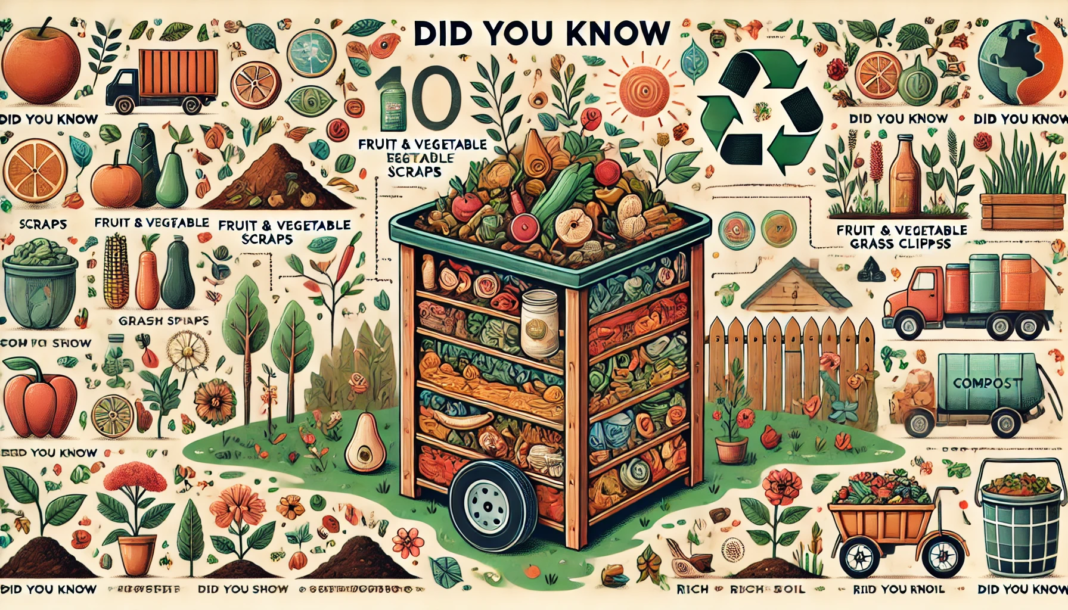Composting is an ancient practice that has gained renewed interest in recent years due to its numerous environmental and agricultural benefits.
It’s a simple yet effective way to recycle organic waste and enhance soil health. Here are the top 10 “Did You Know” facts about composting, designed to enlighten and inspire you to start or improve your composting habits.
1. Composting Reduces Landfill Waste
Fact Explanation
Did you know that composting can significantly reduce the amount of waste sent to landfills? Organic waste, such as food scraps and yard trimmings, makes up a large portion of the garbage that ends up in landfills. When these materials decompose anaerobically (without oxygen), they produce methane, a potent greenhouse gas.
- Environmental Impact: Reducing landfill waste helps lower methane emissions and minimizes the need for new landfill sites.
- Waste Reduction: Composting diverts up to 30% of household waste from landfills.
Real-World Example
Cities like San Francisco have implemented mandatory composting programs, resulting in a significant reduction in landfill waste and a decrease in greenhouse gas emissions.
Why It Matters
By composting, you can help reduce the environmental impact of landfills and contribute to a healthier planet. It’s an easy way to make a big difference in waste management and climate change mitigation.
2. Compost Enriches Soil
Fact Explanation
Did you know that composting creates rich, nutrient-dense soil? Compost, often called “black gold,” is full of nutrients that plants need to thrive. It improves soil structure, enhances water retention, and promotes healthy root development.
- Nutrient-Rich: Compost adds essential nutrients like nitrogen, phosphorus, and potassium to the soil.
- Soil Structure: Improves soil aeration and drainage, making it easier for roots to grow.
Real-World Example
Farmers and gardeners worldwide use compost to enhance crop yields and improve soil health. Organic farms rely heavily on compost to maintain soil fertility without synthetic fertilizers.
Why It Matters
Using compost can reduce the need for chemical fertilizers, promote sustainable farming practices, and enhance the productivity of gardens and agricultural land.
3. Composting Helps Combat Climate Change
Fact Explanation
Did you know that composting helps combat climate change? By reducing methane emissions from landfills and enhancing carbon sequestration in the soil, composting plays a critical role in mitigating global warming.
- Methane Reduction: Prevents methane production by diverting organic waste from landfills.
- Carbon Sequestration: Compost increases soil organic matter, which helps store carbon in the ground.
Real-World Example
The Zero Waste initiative in cities like Austin, Texas, promotes composting to reduce greenhouse gas emissions and improve local climate resilience.
Why It Matters
Composting is a practical, everyday action that can significantly impact the global fight against climate change. By composting, you contribute to a sustainable future.
4. Vermicomposting: A Unique Form of Composting
Fact Explanation
Did you know that worms can help you compost? Vermicomposting uses worms, typically red wigglers, to break down organic waste into high-quality compost. This method is especially useful for small-scale composting in homes and apartments.
- Efficient Decomposition: Worms accelerate the composting process by breaking down waste faster than traditional methods.
- Nutrient-Rich Compost: Vermicompost, or worm castings, is particularly rich in nutrients and beneficial microbes.
Real-World Example
Urban gardeners often use vermicomposting bins to manage kitchen waste and produce compost for their plants. Schools also use vermicomposting to teach students about sustainable waste management.
Why It Matters
Vermicomposting provides a convenient and efficient way to recycle kitchen waste and produce high-quality compost, even in limited spaces.
5. Composting Can Be Done Year-Round
Fact Explanation
Did you know that composting isn’t just a warm-weather activity? With the right techniques, you can compost year-round, even in colder climates. Insulated bins and indoor composting methods ensure that the decomposition process continues despite temperature fluctuations.
- Insulated Bins: Help maintain the internal temperature needed for composting during winter.
- Indoor Composting: Methods like vermicomposting or using electric composters allow composting indoors.
Real-World Example
In colder regions like Canada and northern Europe, gardeners use insulated compost bins to keep composting throughout the winter months.
Why It Matters
Year-round composting ensures a continuous supply of compost and reduces organic waste throughout the year, enhancing sustainability.
6. Composting Reduces the Need for Chemical Fertilizers
Fact Explanation
Did you know that composting can reduce your reliance on chemical fertilizers? Compost provides a natural alternative to synthetic fertilizers, supplying plants with the nutrients they need without harmful chemicals.
- Nutrient Supply: Compost releases nutrients slowly, providing a steady supply over time.
- Soil Health: Improves soil structure and promotes beneficial microbial activity.
Real-World Example
Organic farmers use compost as a primary nutrient source for crops, maintaining soil fertility and health without synthetic inputs.
Why It Matters
Reducing the use of chemical fertilizers benefits the environment by decreasing pollution, enhancing soil health, and promoting sustainable agriculture.
7. Composting Improves Water Retention in Soil
Fact Explanation
Did you know that composting helps improve water retention in soil? Compost increases the soil’s ability to retain water, reducing the need for frequent watering and making plants more resilient during droughts.
- Water Retention: Organic matter in compost improves soil’s water-holding capacity.
- Drought Resistance: Enhances plant resilience to dry conditions.
Real-World Example
Gardeners in arid regions like the southwestern United States use compost to improve soil moisture retention and support plant growth during dry periods.
Why It Matters
Improving water retention in soil through composting can save water, reduce irrigation needs, and support sustainable gardening and farming practices.
8. Composting Supports Beneficial Microorganisms
Fact Explanation
Did you know that composting fosters a healthy soil ecosystem? Compost supports a diverse community of beneficial microorganisms, including bacteria, fungi, and insects, which are essential for soil health and plant growth.
- Microbial Activity: Compost introduces and supports beneficial microbes that help decompose organic matter and improve soil health.
- Disease Suppression: Some microorganisms in compost can help suppress soil-borne diseases.
Real-World Example
Farmers and gardeners use compost to enhance soil microbial diversity, which improves soil structure, nutrient cycling, and plant health.
Why It Matters
Supporting beneficial microorganisms through composting promotes a healthy soil ecosystem, leading to more robust plant growth and reduced reliance on chemical inputs.
9. Composting Can Be a Community Effort
Fact Explanation
Did you know that composting can bring communities together? Community composting programs allow residents to collectively compost their organic waste, fostering community spirit and environmental stewardship.
- Community Programs: Shared composting facilities or programs enable collective composting efforts.
- Education and Outreach: Community composting initiatives often include educational components to raise awareness about composting benefits.
Real-World Example
Cities like New York have community composting programs where residents can drop off food scraps at designated sites, which are then composted centrally.
Why It Matters
Community composting promotes environmental awareness, reduces waste, and strengthens community bonds through shared sustainability efforts.
10. Composting Helps Reduce Soil Erosion
Fact Explanation
Did you know that composting can help combat soil erosion? Adding compost to soil improves its structure and stability, reducing erosion caused by wind and water.
- Soil Structure: Compost improves soil aggregation, making it more resistant to erosion.
- Plant Growth: Healthy plants with strong root systems help anchor soil and prevent erosion.
Real-World Example
Farmers in regions prone to erosion, such as the Midwest United States, use compost to improve soil structure and reduce erosion on their fields.
Why It Matters
Reducing soil erosion through composting helps maintain soil fertility, protect water quality, and support sustainable land management practices.
Conclusion
Composting is a powerful tool for waste reduction, soil enrichment, and environmental sustainability. By understanding and implementing these top 10 “Did You Know” facts about composting, you can contribute to a healthier planet, support plant growth, and promote sustainable practices in your community. Whether you’re a seasoned gardener or just starting, composting offers numerous benefits that extend beyond your backyard.
FAQs
What are the basic components needed for composting?
Composting requires a balanced mix of “greens” (nitrogen-rich materials like vegetable scraps) and “browns” (carbon-rich materials like leaves), water, and air.
How long does it take for compost to be ready?
The time required for compost to mature can vary from a few months to a year, depending on factors like the composting method, materials used, and environmental conditions.
Can I compost meat and dairy products?
While it’s possible to compost meat and dairy, it’s generally not recommended for home composting due to the risk of odors and attracting pests. These items are better suited for industrial composting facilities.
What should I do if my compost pile smells bad?
A bad smell usually indicates too much moisture or insufficient aeration. Turning the compost pile and adding more “browns” can help balance it out and reduce odors.
Is composting suitable for small spaces?
Yes, composting can be done in small spaces using methods like vermicomposting (worm composting) or using compact composting bins designed for apartments and urban environments.



